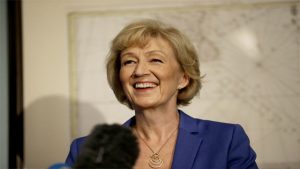 LONDON (AP) — Britain is on course to get its second female prime minister, after Conservative lawmakers chose Home Secretary Theresa May and Energy Minister Andrea Leadsom on Thursday to fight a runoff contest for leadership of the country’s governing party.
LONDON (AP) — Britain is on course to get its second female prime minister, after Conservative lawmakers chose Home Secretary Theresa May and Energy Minister Andrea Leadsom on Thursday to fight a runoff contest for leadership of the country’s governing party.
The race pits a stalwart of the center-right government — May — against a rising star of the party’s right. The winner will become the first woman to lead Britain since Margaret Thatcher, who governed from 1979 to 1990, transforming the country with her staunchly free-market policies.
May received 199 votes in a ballot of Conservative members of Parliament, while Leadsom received 84. Justice Secretary Michael Gove got 46 votes and was eliminated from the race. Some 150,000 Conservative Party members will now vote by postal ballot on the two candidates, with the result announced Sept. 9.
The winner will replace Prime Minister David Cameron, who announced his resignation after Britain voted last month to leave the European Union.
May, the government’s formidable interior minister, is the bookies’ favorite to defeat Leadsom, a legislator who emerged as a star of the victorious “leave” campaign in Britain’s EU referendum. May supported the “remain” camp but says she has the mettle to unite a party that — like the country — is divided over the referendum result.
The new leader will be responsible for leading Britain’s exit negotiations with the 28-nation EU as well as helping to steady the country’s government and economy, which has been deeply shaken by markets’ reaction to the EU vote.
The result of the ballot is a slap in the face for Gove, whose ambition to lead the country lasted only a week. He campaigned for an EU exit alongside popular former London Mayor Boris Johnson, who had been expected to seek the party leadership, with Gove as his campaign manager.
But Gove shocked the party by announcing last week that he had decided Johnson was not up to the job and declaring himself a candidate instead. The betrayal probably hurt his leadership chances, fueling a view among Tories that he is disloyal.
Gove said he was “naturally disappointed” to be out of the race, but said “both Theresa May and Andrea Leadsom are formidable politicians.” May, Britain’s interior minister for the past six years, is the runaway favorite among lawmakers — but the Conservatives have a history of not always choosing the favorite.
May, 59, pitches herself as the Conservatives’ unity candidate. She said she was delighted to have won support from “leavers and remainers, MPs from the length and breadth of the country.”
“This vote shows that the Conservative Party can come together — and under my leadership it will,” she said.
Leadsom, 53, argues that the prime minister should be someone who truly believes in a British exit, or Brexit. Her plainspoken, common-sense style and strong opposition to the European Union have made her popular with the party’s grassroots membership, which is older and more euroskeptic than the British average.
In a speech to supporters, Leadsom vowed to “banish the pessimists” worried about Brexit, and argued that that Britain could retain free trade with the EU while simultaneously controlling immigration — an unrealistic prospect, according to critics.
Leadsom, who entered Parliament in 2010 after a career in financial services, has less political experience than May, and has faced allegations from rivals that she exaggerated the seniority of her financial sector jobs. She denies the claims.
The party’s socially progressive wing is concerned by her opposition to gay marriage and by the support she has drawn from members of the hard-right U.K. Independence Party. Leadsom was endorsed Thursday by former UKIP leader Nigel Farage, who tweeted: “Important that the next Prime Minister is a Brexiteer — she has my backing.”
